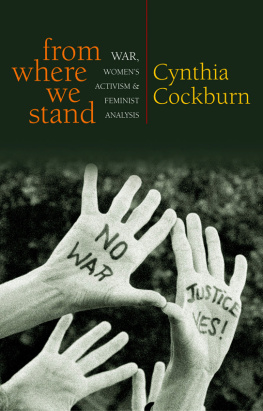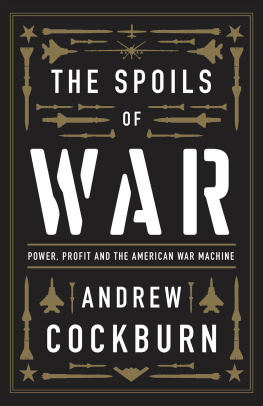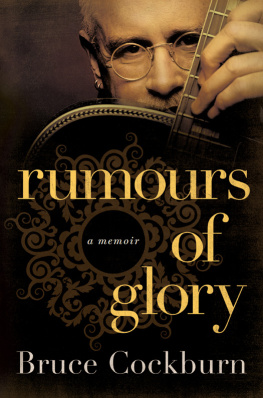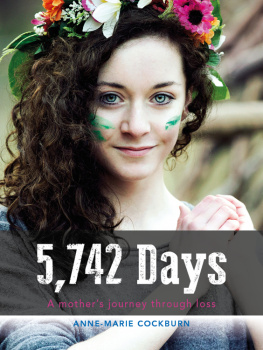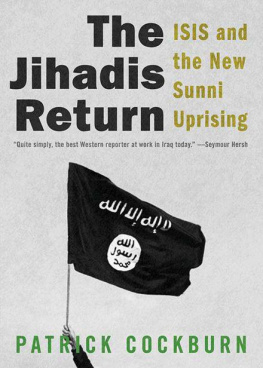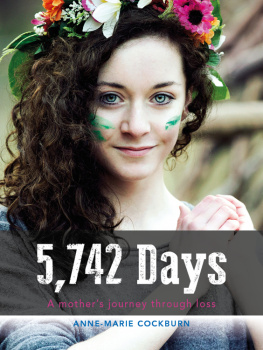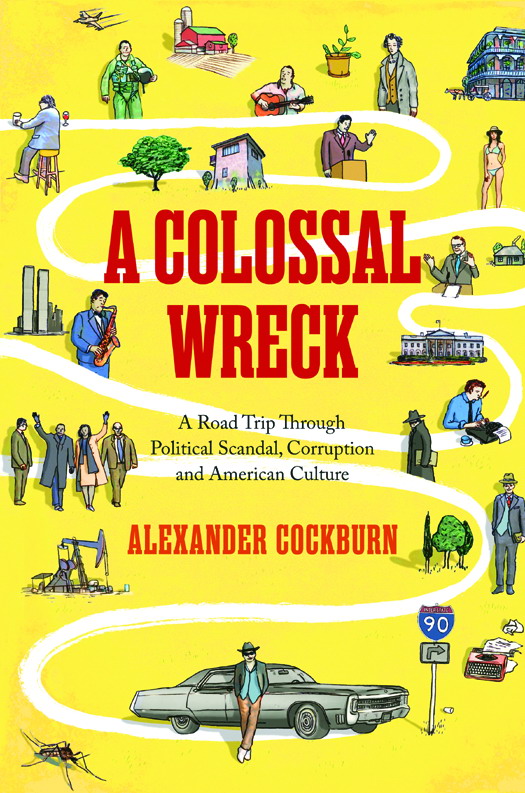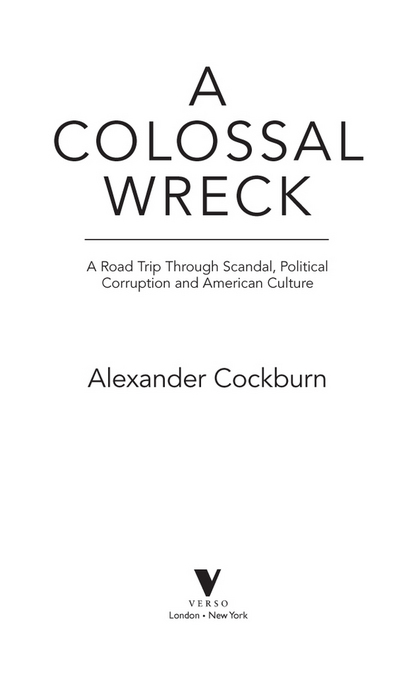First published by Verso 2013
Alexander Cockburn Living Trust 2013
Introduction Andrew Cockburn 2013
Afterword Daisy Cockburn 2013
All rights reserved
The moral rights of the authors have been asserted
Verso
UK: 6 Meard Street, London W1F 0EG
US: 20 Jay Street, Suite 1010, Brooklyn, NY 11201
www.versobooks.com
Verso is the imprint of New Left Books
British Library Cataloguing in Publication Data
A catalogue record for this book is available from the British Library
Library of Congress Cataloging-in-Publication Data
Cockburn, Alexander.
[Essays. Selections]
A colossal wreck : a road trip through political scandal, corruption, and American culture / Alexander Cockburn. First edition.
pages cm
Summary: Alexander Cockburn was one of the most influential journalists of his generation. As the Atlantic noted, he was a towering figure who would say all the outrageous things his bland counterparts lacked the wit, courage, erudition, or epater-spirit to utter on their own. In A Colossal Wreck, written prior to his death in July 2012, Cockburn reveals his great literary spirit, incisive reading of the situation, and campaigning vim into a single volume that will undoubtedly be seen as his masterpiece. Whether ruthlessly exposing the hypocrisy of Washington from Clinton to Obama, pricking the pomposity of those in power, or tirelessly defending the rights of the oppressed or silenced, Cockburn was the most gifted contrarian of his generation Provided by publisher.
eISBN: 978-1-78168-182-4
1. United StatesPolitics and government1993-2001. 2. United StatesPolitics and government2001-2009. 3. United StatesPolitics and government2009- 4. Politics, PracticalUnited States. 5. Political cultureUnited States. 6. Political corruptionUnited States. 7. United StatesSocial conditions1980- 8. World politics20th century. 9. World politics21st century. 10. Cockburn, Alexander. I.
Title.
E885.C625 2013
320.09730905dc23
2013018400
v3.1
I met a traveller from an antique land
Who said: Two vast and trunkless legs of stone
Stand in the desert. Near them, on the sand,
Half sunk, a shattered visage lies, whose frown,
And wrinkled lip, and sneer of cold command,
Tell that its sculptor well those passions read
Which yet survive, stamped on these lifeless things,
The hand that mocked them, and the heart that fed;
And on the pedestal these words appear:
My name is Ozymandias, king of kings:
Look on my works, ye Mighty, and despair!
Nothing beside remains. Round the decay
Of that colossal wreck, boundless and bare
The lone and level sands stretch far away.
Shelley, Ozymandias
Contents
Introduction
By Andrew Cockburn
Some fool back in the 90s excoriated Alexander in the leftish English weekly the New Statesman for being anti-American. The context, as I recall, was a paean to the supposedly radical initiatives of the Clinton administration, as contrasted with the moribund conservative regime in Britain. My brother, as readers of the present volume will shortly be reminded, never had any illusions about Clinton (or Hillary, one of natures bluestockings), his reports on that theme thus exciting the indignation of this transatlantic Clintonista. It may have been the very stupidest of all the insults hurled over the years at Alexander. From the moment he landed here in 1972 (following the Mysterious Affair of the Balham Parrot, see ), he embraced with arms flung wide what he called the vastness, the richness, the beauty and the grotesqueries of America in all its thousand landscapes.
His knowledge of those landscapes was profound, deepened over decades by wide-ranging and meticulously planned voyages of exploration into the hinterland, in which disparate samples of historical, biological, cultural, anthropological, and political interest were eagerly scanned and evaluated. See for example his description of Midland, Texas, as surveyed in July 2001. In a scant 900 or so words we learn about the incredible heat of the place; its economic position relative to neighboring Odessa; Audubons condition (sedentary) at the time he painted his electrifying series on viviparous quadrupeds (look it up, Alexander always believed people should use the dictionary); the vulgar gossip that Laura Bush, wife of George W., had a racy twenties before settling down; a review of the Permian Basin Petroleum Museumdoes for hydrocarbons what the Uffizi does for Renaissance Italysegueing into a history of oil in west Texas; the Bush familys unsuccessful efforts to make a big pile of money in same; a telling reminder that while grimier Odessa has been a contender for Murder Capital USA, the more upscale Midland is the rape capital of Texas. A few days later he has moved on to a knowledgeable analysis of the political and journalistic trajectory of Katherine Graham, erstwhile proprietor of the Washington Post. (She had just died.) Many of us will never go to Midland and didnt know Mrs. Graham, but as with so much of the landscape that fell under Alexanders enthusiastic inspection, we need feel no loss. We can go there with him.
He could get interested in anything or anyone, which is why he got on so well with children. Rarely did he encounter someone for whom he had no kind word whatsoever, though exceptions included Barbara Bush, wife of forty-one, mother of forty-threeone of the meaner women Id met in a long timeand various highway patrolmen insistent that some ancient vehicle had managed to exceed the speed limit: His ferrety little eyes swivel around the back of the station wagon, linger on some cactuses Ive picked up in a nursery in Truth or Consequences, linger further on my Coleman ice chest and then came back to my car papers The station wagon in question, a 1964 Newport, had spent the previous six years sitting in a field. A wood rat had built a nest in the glove compartment, and three of the four door locks were frozen. This was just one of the fleet of classics whose mechanical shortfalls were guaranteed to supply the necessary elements of chance and serendipity on his expeditions, connecting him to an archipelago of AAA tow-truck operators, garage mechanics, motel desk clerks, barbeque chefs and other denizens of the hinterland he loved. It was a better way than most of connecting with various emotional wellsprings in the American psyche, as on the day we pulled into a gas station in eastern Oklahoma in a newly acquired 59 Chrysler Imperial convertible sometime in the early 1980s and a fellow customer broke down in tears at the sight of the proud machine, exclaiming that was when America was worth something; you ought to take that thing to Detroit and park it outside Chrysler headquarters so theyd be ashamed of themselves. (Later, Alexander did just that, tracing the actual cars precise heritage via its Vehicle Identification Number and the UAW to the production line that birthed it, manned at the time by middle-class Trotskyites from Long Island who had migrated to Detroit years before in confident but misplaced anticipation of the proletarian revolution.)
Traversing landscapes both beautiful and grotesque (Marthas Vineyard that hateful island), Alexanders last book in no way stints on the scandalthose vulgar rumors about Laura B., for exampleand political corruption as promised in his subtitle. In fact it delivers far more, presenting future generations with a highresolution view of the great pileup, the colossal wreck, of the system as it careened off the end of the twentieth century and into the rocky landscape of the twenty-first. As such, it should be on the reading list of all school and college contemporary history courses, an honest chronicle from one who followed faithfully the injunction of the nineteenth-century London


